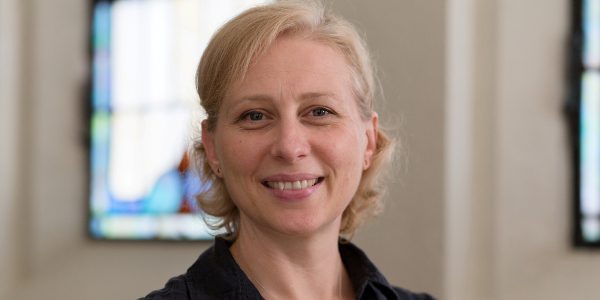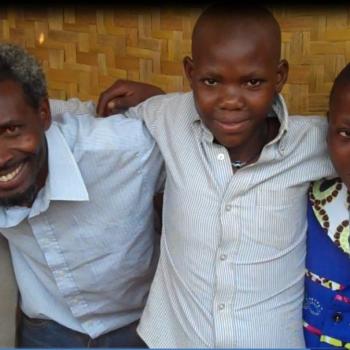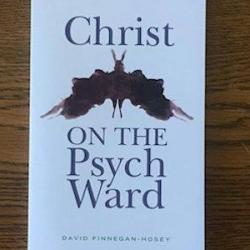I first encountered Mandy Smith at the 2014 Ecclesia National Gathering where she preached an amazing sermon on the “double-edged sword” of God’s word in Hebrews 4. She pointed out that most of us see this sword as a weapon for us to use against our opponents when in fact it’s a scalpel that God uses to operate on our hearts. I originally blogged about her sermon here. Over the past couple of weeks, I’ve been reading through Mandy Smith’s amazing book The Vulnerable Pastor (now featured at the Patheos Book Club). I really hope that she’s right about how God uses weak and broken people for ministry because I’m certainly a mess myself. Anyway, here are my four favorite quotes from her book.
There’s plain old weakness. Then there’s plain old control. But there’s a third thing that I’ve yet to know how to name. It’s when I’m aware of my smallness but there’s no shame in it, no grappling for more but a peace in the immensity around me. [45]
I long to experience the smallness without shame that she describes. I have had glimpses of it. I really want to believe that an omnipotent being is actually running the show and giving me bits and pieces to carry so that I can feel relevant like a five year old proudly helping his dad by stirring the chili in the kitchen. But I haven’t yet learned how to trust in that higher power that I talk and blog about all the time. I still feel completely responsible and completely judged for the results that do or don’t happen in my ministry.
At [University Christian Church] we spend a lot of effort learning to dance wherever God is. Any point of clarity we find, any sign of goodness, any experience of his presence we paint and talk and write and sing about. Alan Hirsch and Michael Frost’s writing about centered and bounded sets has helped us in this. As an Aussie, I love their metaphor, which is taken from the Australian Outback: On huge farms in Australia where the livestock roam over hundreds of miles, the farmers don’t need to build fences but instead, in that arid landscape, they keep their animals close by digging wells. [57]
I am very much an advocate of centered rather than bounded sets when it comes to theology, meaning I’m less concerned about policing the boundaries of who’s in and who’s out and more concerned about articulating the essentials beautifully enough so that people are drawn to them. This is because I believe that we’re all heretics to varying degrees but the Spirit is meeting all of us where we are and drawing us to where we need to go. One of my favorite images of the Holy Spirit comes from C.S. Lewis’ The Lion, The Witch, and the Wardrobe. When the Pevensee children enter into the magical world of Narnia, a talking beaver says to them, “Come further in! Come further in!” That’s what I believe the Holy Spirit is always saying to all of us. The wells of living water are always calling us into deeper communion with God. So it’s not so much about policing conformity to established doctrine as it is about a journey of continued discovery of God’s goodness in which we draw attention to inspiring truths.
Often we begin ministry with a sense of something huge — an immense task, a great need, a vision of God’s grandeur, an overwhelming sense of call– then we shape a ministry program to respond to that challenge. Out of a pure sense of survival, I tried starting the other way. What if we began with our human limitations and shaped a ministry from that? [105]
It’s very comforting and liberating to read someone writing about ministry coming from a place of survival and human limitations rather than pristine, grandiose visions that are innately compelling and draw huge crowds of people. I’m in survival mode, just trying to figure things out as I go along. I’m learning what works and what doesn’t, but it’s more often an expression of survival and human limitations than the “something huge” that the wildly successful, perfectly confident pastors are doing.
Do our sermons ask the question and answer it before our listeners have a chance to hang in the in-between?… It’s not our job as teachers to help people avoid the discomfort but to create space for them to pay attention and learn from it. Instead of serving up prepackaged applications, perhaps we could see our sermons as a field trip that collects people from where they live, takes them to a broad, open place and says, “Go explore and let’s meet back here so that on the way home we can talk about what we’ve found.” [170]
I really like her vision for what sermons are supposed to do. In hierarchical, authoritarian Christianity, preaching isn’t about a learning process so much as indoctrination. So the pastor has all the answers and simply proclaims them; everybody writes down the right answers; and there’s no real thinking or learning that happens. I like this open-ended vision so much better. I will have to think about how to leave open space and not answer every question that I raise.
We may never arrive at a policy on vulnerability for every situation, and that’s part of our vulnerability — to figure it out as we go and give ourselves grace when we over- or undershare. [174]
I think this is one of the most honest sentences I’ve ever read about vulnerability. It’s not something for which we can create a perfect universal policy in all of our relationships and all of our communication. We are constantly testing, learning, and evolving. I’ve gotten burned for oversharing in the past, so I’m learning how to set better boundaries for myself. But even the word boundary is a little bit misleading because it suggests something permanent and fixed. I don’t think that making myself a rigid bureaucrat for the sake of consistency is compatible with being an authentic pastor. Honestly I have to adapt my approach for each individual pastoral relationship because that’s what it takes to be fully present which is my ultimate goal.
Read an excerpt from Mandy’s book at the Patheos Book Club here.













